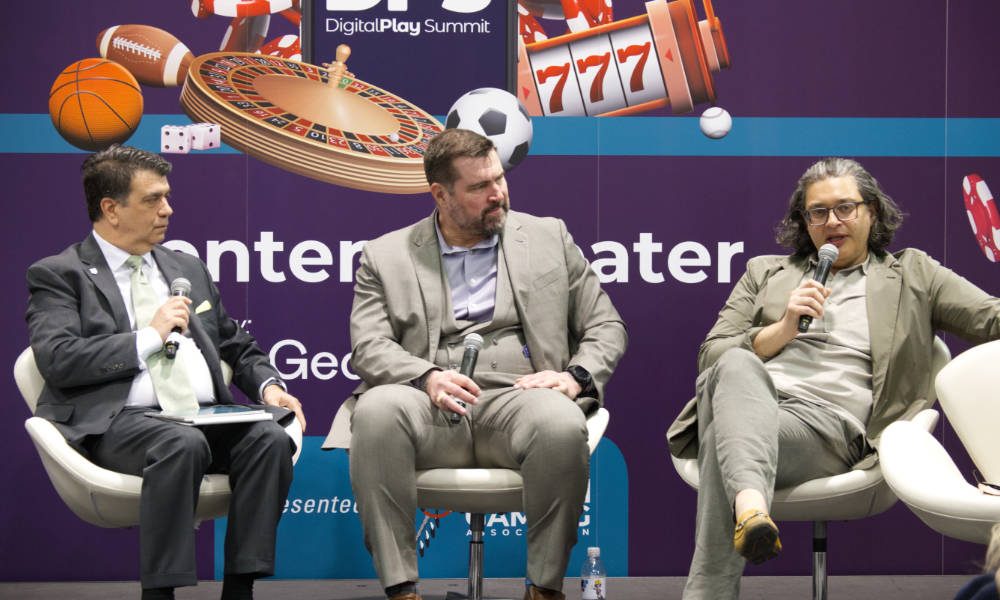The collapse of FTX in 2022 has slowed the adoption of cryptocurrency in the gaming industry, but the CEO of Sightline Payments says it still has a future use in casinos.
The collapse of the third-largest crypto exchange led to its founder and former CEO San Bankman-Fried’s sentencing to 25 years in prison and ordered to repay $11 billion. The subject came up during a panel discussion at the Indian Gaming Association Tradeshow & Convention session, “Got Cashless? Watch out! The Pitfalls, Detection, and Practices to Protect Your Casino’s Mobile App and Mobile Wallets!”
“What happened with FTX was disappointing,” said Omer Sattar, founder and CEO of Sightline Payments said about cryptocurrency. “I’m not just disappointed with all the money that was lost, but the fraud that was committed. It really set crypt back with gaming regulators, but that noise will dissipate. Virtual is real. It’s not going anywhere and at some point, it’ll be validated for bringing money into gaming. Jurisdictions will move forward with it.”
Sattar said the slow adoption rate for cashless gaming will be overcome as the technology advances. He was blunt, however, when it came to the cashless-gaming sector, calling the first iterations of their products “terrible.” The second iteration was “slightly better,” while the third “will be even better.” Even so, that’s not good enough for broad-scale adoption.
“You reach an inflection point with new payment technology. And we’re not even close to that right now. We need to offer better products.”
Sattar said one product will never fit all the needs; people should have players cards, because casinos should know where the money is coming from. But the industry will evolve.
“It’s important to build a system from the onset like that, but others will experiment with systems where the players are completely anonymous. You’ll want to offer that as well, because some people want to stay anonymous,” Sattar said. “It won’t be one system. Two or three will effectively piece together the complete solution. But the journey isn’t very good right now. It takes customers five to seven minutes to do it, when it should take only a minute or two.”
Even though it faces obstacles, Sattar and fellow panelist Victor Newsom, senior vice president of payment solutions for Everi, remain optimistic about the future of cashless gaming.
Newsom said they have about 130 casinos doing cashless with a debit card and 50 with fully integrated wallets. A handful are doing cryptocurrency with the ability to send money to a debit card. He said they see double-digit transfer to cashless within 18 months with some of their customers.
“We’ve talked about big adoption for years. We know consumers have a desire for cashless and now we’re seeing this stuff work and actually have economic drivers for the CIOs,” Newsom said.
Sattar estimated 70 to 80 casinos around the country are experimenting with e-wallets. “It’s not all doom and gloom. We’re making it sound super dire. Folks like us are trying to make the product better. We see usage. The VIPs pre-fund their accounts with hundreds of thousands of dollars.”
Sattar said lots of technology is coming, citing FedNow and Request for Pay.
“You can move money from your checking account in real time to things you want to do,” Sattar said. “End providers will offer a way for that money to come into the gaming system.”
There are other issues to overcome. Casinos are worried about losing out on revenue from ATM fees.
“I can see it from the CFO’s perspective. The CEO and GM might want to experiment, but the CFO is worried about (the lost revenue) if you’re not going to charge fees,” Sattar said. “The question becomes how much lift in play does there have to be in order to give up the fees you’re going to potentially give up. Try it both ways. Don’t give up fees. Let the cash transaction happen just the way it does with the fees you charge today and try the same thing with the same fees on an electronic transaction and see if you see a lift or decrease in play. Once you’re comfortable with that, you can experiment with what you’ve done with fees.”
Newsom said regulations also play a role in how seamless cashless gaming can be and suggested it’s time to go to the Nevada Gaming Control Board and other regulatory bodies to urge changes be made to improve the experience. That would help increase its usage.
“If you’ve spent time getting a loyalty card, signing up for cashless wagering account, and getting a banking account just so you can do what you can already do with cash, we’ve failed,” Newsom said.
The discussion was moderated by Sam Basile, vice president of Business Development North America for GeoComply Solutions. Basile said the form of payment that comes from the mobile phone brings about all kinds of opportunities for third parties to commit crimes.
Operators have experienced online-account takeovers and hackers on the dark web can hack anybody’s digital account.
“There’s the potential for withdrawing those funds and that’s predominately the purpose of an account takeover,” Basile said. “The good news is you can detect a different device and a different location, so you can send an alert to pause and investigate further.”
Sattar said fraud rings operating at casinos have been an issue. They fund an account, go to a table game, and cash out, but operators are learning to deal with it.
“We’ll never destroy fraud,” Sattar said. “The best we can do is to try to destroy the fraudsters trying to hit us, making their lives so difficult, they go someplace else. That’s the cat-and-mouse you’re going to play.”



